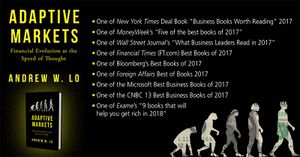Adaptive Markets: Financial Evolution at the Speed of Thought
Adaptive Markets: Financial Evolution at the Speed of Thought is a book by Andrew W. Lo.[1]

"Half of all Americans have money in the stock market, yet economists can't agree on whether investors and markets are rational and efficient, as modern financial theory assumes, or irrational and inefficient, as behavioral economists believe--and as financial bubbles, crashes, and crises suggest. This is one of the biggest debates in economics and the value or futility of investment management and financial regulation hang on the outcome. In this groundbreaking book, Andrew Lo cuts through this debate with a new framework, the Adaptive Markets Hypothesis, in which rationality and irrationality coexist. Drawing on psychology, evolutionary biology, neuroscience, artificial intelligence, and other fields, Adaptive Markets shows that the theory of market efficiency isn't wrong but merely incomplete. When markets are unstable, investors react instinctively, creating inefficiencies for others to exploit. Lo's new paradigm explains how financial evolution shapes behavior and markets at the speed of thought--a fact revealed by swings between stability and crisis, profit and loss, and innovation and regulation. - From the book summary at Amazon.com[2]
"For a sweeping analysis of what's wrong - and what's right - about the libertarian theory that free financial markets are optimally efficient, I recommend Adaptive Markets: Financial Evolution at the Speed of Thought by MIT Sloan professor Andrew W. Lo" - David Wood, Executive Director, Transpolitica[3]
MIT Sloan Finance Group - May 2017Править
Are financial markets rational and efficient, as modern financial theory assumes, or irrational and inefficient, as behavioral economists believe?
External linksПравить
ReferencesПравить
- ↑ Adaptive Markets | Princeton University Press
- ↑ https://www.goodreads.com/book/show/32889382-adaptive-markets Goodreads.com Summary
- ↑ https://twitter.com/dw2/status/1055828531534589954 Thread on Twitter